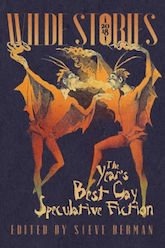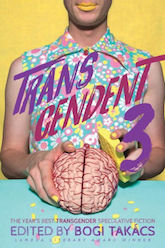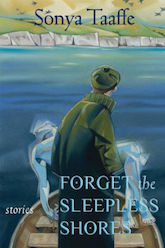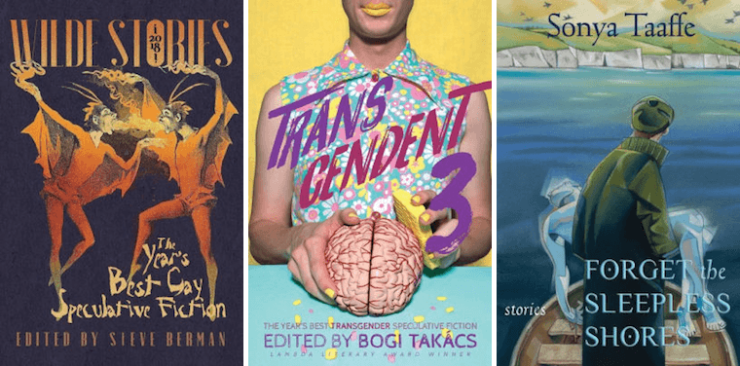Lethe Press has been a consistent source of queer speculative fiction for more than a decade now, with an ever-expanding catalogue of writers from diverse and engaging backgrounds. In fact, some of the earliest Queering SFF posts I wrote for Tor.com included an interview with the owner of the press, Steve Berman—and a review of Wilde Stories 2010, his annual best-of gay sff collection. I was twenty years old at the time and I’d been reading Wilde Stories since I was a teenager, hungry for openly marked queer content. In the intervening years, Lethe’s reach has expanded to include lesbian and trans years-best collections, multiple Lambda awards for novels and short fiction alike, and so forth.
However, this year’s edition marks the final release of Wilde Stories. In honor of that long run—and to give a sense of the delightful breadth and depth of queer short fiction the press is producing in 2018—I thought I’d do a review roundup of three recent collections, all published in the past six months, including the last volume of the series that brought my attention to Lethe in the first place.
Wilde Stories 2018 edited by Steve Berman
Buy the Book


Wilde Stories 2018
The final volume of Wilde Stories includes a demonstrative range of work: stories collected from publications both inside and outside the “mainstream” magazines of sf, writers at all stages of their careers, and as Berman notes in the closing, writers of increasingly diverse backgrounds. There is a pervasive tone of melancholy or even loss threaded through the stories here—perhaps just in my mind as I’m considering the goodbye, but also perhaps as a result of the difficulties facing queer men in a year like 2017. Uncertainty and fear lurk beneath the surface, but so too does hope and the possibility of connection, of fresh starts. Berman’s signoff notes the changing market in the past decade as more and more queer voices find their way to the forefront, and as I look back over the years I’ve been reading Wilde Stories, I’m inclined to seriously agree. This series, taken from beginning to end, provides a snapshot of that evolution.
Standout stories here include those from contributors whose work has appeared year after year in the series—Rich Larson, for example—and others who appear for the first time, like Xen, whose novelette “Cracks” was originally published in FIYAH literary magazine. John Chu’s “Making the Magic Lightning Strike Me” was a favorite. The protagonist’s struggles with body image are wrapped up in technological and capitalist enterprise, balanced against his platonic but lingering, what-if intimate friendship with another queer man. Chu’s ability to render the specific tension of that type of friendship, alongside the eerie and compelling details of the protagonist’s high-risk career doing a version of mostly-consensual kidnapping, make for a weird and wonderful piece of fiction. I was also struck by the intimacy and rage of Sam J. Miller’s “The Future of Hunger in the Age of Programmable Matter,” which also dances the line between a large-scale sfnal concept story and the raw emotional detail of before-and-after for an unhealthy relationship. The big concept forms both the set and the grist for the mill, but the humans are the visceral driver of the story’s movement. It’s the type of sf I love best, and it’s very much present here.
Transcendent 3: The Year’s Best Transgender SF, edited by Bogi Takács
Buy the Book


Transcendent 3
As with the previous two volumes, Transcendent 3 is crisp and original. The range of writers collected here, too, spans from folks at the starting stages of their publishing careers to award-winning familiar names, featuring a host of approaches: different cultures of origin, different genres, different prose styles, different genders and representations of gendered experience. Takács has done an excellent job with the editorial arrangement and pacing—each story flows with ease into the next despite the range crossed between them, in terms of tone and also emotional impact. Some stories are light and pleasant, meditative; some are frightening and wrenching; most of the pieces struck a resounding note regardless of their approach, be that narrative or emotional in nature. As for shared themes, several featured supernatural creatures or transitions (an understandable motif): ghosts, vampires, shapeshifters, and rhizomal nonhuman sentient species to name a few.
While it’s hard to narrow down favorites, there are a few pieces that stuck deeper than others. “Cooking with Closed Mouths” by Kerry Truong is a quiet meditation on food, liminal spaces, and bonding between a gumiho and their vampire partner after immigrating to the USA from Korea. There’s also “Small Changes Over Long Periods of Time” by K.M. Szpara, wherein a gay trans man must manage the transition from life to undeath after a nonconsensual vampire bite—and it isn’t much more medically friendly than his first transition. “Feed” by Rivers Solomon is a slice-of-life near future sf piece with striking, compact prose that sketches a depth of world in a short space I very much appreciated, while also providing insight into the clumsy conflicts of youthful relationships and social media/engineering. The most disturbing and contemporarily-dystopic of the stories included is Charlie Jane Anders’s “Don’t Press Charges and I Won’t Sue,” in which a conservative movement is kidnapping and forcefully reassigning the bodies of trans people via a monstrous cadaver-brain-exchange process. The piece is visceral and rife with medicalized body-horror, violent trauma, and transphobia. It’s brutally well written and executed, the kind of plausible nightmare with enough human terror that it’ll haunt the reader well after finishing.
Forget the Sleepless Shores by Sonya Taaffe
Buy the Book


Forget the Sleepless Shores
There are, of course, single-author collections as well. Sonya Taaffe’s second collection of short fiction following Singing Innocence and Experience (2005), Forget the Sleepless Shores is a haunting, quiet collection of primarily magic-realist stories—poetic and melancholy, echoing Taaffe’s usual liminal occupation of multiple genres and modes. The tonal resonance of the collection is uniform, which is neither a positive or negative but makes for a lush-unto-overwhelming reading experience if consumed in one go. For this sort of fiction—eerie, lyrical, meditative—the best approach tends to be sips and visitations. Forget the Sleepless Shores is ideal when consumed one piece at a time with pauses between to allow the affect to crest, settle, and pass on.
Of the pieces collected here, favorites included “The Dybbuk in Love,” which knots up Jewish folklore, contemporary fiction, and the gutwrenching pull of connection and boundaries (or loss of them) between self and soul and flesh. I also was fond of “The Creeping Influences,” an Irish historical whose protagonist is queer and transgender. Taaffe’s gift for prose brings the dialect and the setting to life dramatically, from the bog-body to the murder and the stretch of space between. “The Face of the Waters” is the one piece original to the collection; the epiphany of the mundane crossing paths with the otherworldly in an abrupt, dislocating collision features in it as well. Julian almost slips into the Birmingham canals—drunk after a fight with his boyfriend—and is rescued by a creature who then sits with him, sharing a cigarette and also a sort of intimate awareness of the meaning of drowning, being drowned, in the city he calls home. Introspective and unnerving, poetic and affective: it’s what Taaffe does best.
2018 also saw several additional single-author collections of queer fiction from Lethe worth checking out, including Philip Dean Walker’s Read by Strangers, Anya Martin’s Sleeping with the Monster, and Scott Edelman’s Tell Me Like You Done Before. And of course there are the novels, but that’s for another day. This was a strong, steady year for the press—one of the only publishers consistently dedicated to queer sf in long and short form—and I’m eager to see what writers, new and familiar both, will have their work featured in the coming year as well.
Lee Mandelo is a writer, critic, and editor whose primary fields of interest are speculative fiction and queer literature, especially when the two coincide. They have two books out, Beyond Binary: Genderqueer and Sexually Fluid Speculative Fiction and We Wuz Pushed: On Joanna Russ and Radical Truth-telling, and in the past have edited for publications like Strange Horizons Magazine. Other work has been featured in magazines such as Stone Telling, Clarkesworld, Apex, and Ideomancer.










